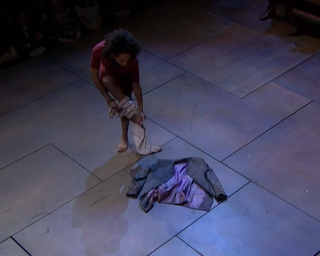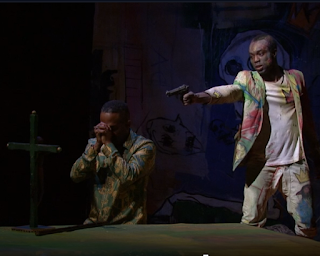Godwin's 2016 RSC Production: Act One
One of the unexpected benefits of lockdown has been the proliferation of free-to-air theatrical performances. The RSC's 2016 production with Paapa Essiedu as Hamlet has been shown on BBC iPlayer as part of their Culture in Quarantine access, and now forms part of our study.
Act One runs for 41 minutes.
The glimpse of Wittenberg student life emphasises the kind of world that Hamlet has 'lost', in addition to the loss of his father, as he arrives home. It also reminds the audience of his youth, and the celebratory moment of having a diploma conferred contrasts effectively with the grief later in Act One; the snapshot effect is also a signifier of change: a moment lost forever. Beyond this, the production has been described as the 'most traditional of interpretations'.
For the first 'ghost' scene (though no ghost appears), the low, blue-black lighting means the actors are almost imperceptible at times - certainly difficult to pick out in the stage gloom. This gives the scene an eerie, edgy atmosphere, compounded by the military fatigue costumes and makeshift checkpoint that are suggestive of a West African military state. Tension and unease dominate - there is a sense that it could all 'kick off' at any moment.
In the next scene Gertrude is established as a formidable presence (excellent!) while Claudius is a silky-smooth orator. Hamlet's first line, 'A little more than kin, and less than kind' (I.ii.65), throws down the gauntlet and is his opportunity to acknowledge the 'snub' he has received at being downgraded in the pecking order: Laertes was addressed first. Essiedu's Hamlet repeatedly looks to interrupt Claudius, and seems on the point of entreaty at the request not to return to Wittenberg; but he is maneuvered into position by the politician's oily rhetorical skill. Claudius' telling wipe of the brow is the only giveaway as to quite what was at stake during the exchange. Hamlet's tears, and the hiding of them from other members of the court, are powerful indicators of a grief that needs to remain private. The loosening of his tie during the first soliloquy helps create an intimacy with his audience. The words 'wicked speed' seem to dominate and echo around the auditorium as they are slowed down. The hasty marriage has really upset him.
Horatio's arrival is a relief for the audience as the intensity of that first soliloquy is lifted. What also comes across is the warmth - and delight - that Hamlet takes from their friendship. The greeting lifts him from the desperation of a moment earlier, but also show that he is in an emotional state that will be readily susceptible to the ghost story he is about to hear.
In scene three, the simple detail of Laertes' wheelie luggage front of stage makes his imminent departure a reality. Ah, foreign travel. Remember that? Ophelia's cringing response to Laertes' reference to the physical side of her relationship with Hamlet seems natural, as does his need to assert brotherly protection during his imminent absence. Polonius' arrival seems to disturb the easy intimacy between the siblings. When Ophelia kneels down to change her father's shoes we see the submissive, dutiful daughter enacted in the physical levels on the stage as she is positioned lower than him. But she is also playful, and provocative at times. She treads a careful line between the patriarchal restrictions imposed upon her in the 'pincer movement' as she is caught between the dominance of her father and her brother, and her own wish-fulfilment.
Next we return to Hamlet and the darkness of the 'watch'. This is where for me, the staging decisions translate best into a contemporary setting. The drumming and smoke and wild shrieks suggest something shamanic and occult and darkly African; far-removed from Stratford-Upon-Avon - and therefore believable. As Cavendish puts it,
Whenever the show’s handful of drummers start pounding away, though, the energy levels rise and there’s a fantastic moment early on when Essiedu twitches and judders to a frantic beat, summoned to see the ghost of his father. At a stroke the relationship between this mourning, modern-dressed son and his colourfully berobed forebear is freshly reimagined as a form of possession.
After the mingling of blood as Hamlet forces them all to swear secrecy, the production of a gun brings the threat of violence even closer.
Act One runs for 41 minutes.
The glimpse of Wittenberg student life emphasises the kind of world that Hamlet has 'lost', in addition to the loss of his father, as he arrives home. It also reminds the audience of his youth, and the celebratory moment of having a diploma conferred contrasts effectively with the grief later in Act One; the snapshot effect is also a signifier of change: a moment lost forever. Beyond this, the production has been described as the 'most traditional of interpretations'.
For the first 'ghost' scene (though no ghost appears), the low, blue-black lighting means the actors are almost imperceptible at times - certainly difficult to pick out in the stage gloom. This gives the scene an eerie, edgy atmosphere, compounded by the military fatigue costumes and makeshift checkpoint that are suggestive of a West African military state. Tension and unease dominate - there is a sense that it could all 'kick off' at any moment.
In the next scene Gertrude is established as a formidable presence (excellent!) while Claudius is a silky-smooth orator. Hamlet's first line, 'A little more than kin, and less than kind' (I.ii.65), throws down the gauntlet and is his opportunity to acknowledge the 'snub' he has received at being downgraded in the pecking order: Laertes was addressed first. Essiedu's Hamlet repeatedly looks to interrupt Claudius, and seems on the point of entreaty at the request not to return to Wittenberg; but he is maneuvered into position by the politician's oily rhetorical skill. Claudius' telling wipe of the brow is the only giveaway as to quite what was at stake during the exchange. Hamlet's tears, and the hiding of them from other members of the court, are powerful indicators of a grief that needs to remain private. The loosening of his tie during the first soliloquy helps create an intimacy with his audience. The words 'wicked speed' seem to dominate and echo around the auditorium as they are slowed down. The hasty marriage has really upset him.
Horatio's arrival is a relief for the audience as the intensity of that first soliloquy is lifted. What also comes across is the warmth - and delight - that Hamlet takes from their friendship. The greeting lifts him from the desperation of a moment earlier, but also show that he is in an emotional state that will be readily susceptible to the ghost story he is about to hear.
In scene three, the simple detail of Laertes' wheelie luggage front of stage makes his imminent departure a reality. Ah, foreign travel. Remember that? Ophelia's cringing response to Laertes' reference to the physical side of her relationship with Hamlet seems natural, as does his need to assert brotherly protection during his imminent absence. Polonius' arrival seems to disturb the easy intimacy between the siblings. When Ophelia kneels down to change her father's shoes we see the submissive, dutiful daughter enacted in the physical levels on the stage as she is positioned lower than him. But she is also playful, and provocative at times. She treads a careful line between the patriarchal restrictions imposed upon her in the 'pincer movement' as she is caught between the dominance of her father and her brother, and her own wish-fulfilment.
Next we return to Hamlet and the darkness of the 'watch'. This is where for me, the staging decisions translate best into a contemporary setting. The drumming and smoke and wild shrieks suggest something shamanic and occult and darkly African; far-removed from Stratford-Upon-Avon - and therefore believable. As Cavendish puts it,
Whenever the show’s handful of drummers start pounding away, though, the energy levels rise and there’s a fantastic moment early on when Essiedu twitches and judders to a frantic beat, summoned to see the ghost of his father. At a stroke the relationship between this mourning, modern-dressed son and his colourfully berobed forebear is freshly reimagined as a form of possession.
After the mingling of blood as Hamlet forces them all to swear secrecy, the production of a gun brings the threat of violence even closer.




I thought this production was great, I especially enjoyed the hints of sarcasm and humour which were littered throughout the play, I think it was refreshing for a modern audience. "I shall in all my best obey you, madam" seems to stick in my mind, as Essiedu's stress that he would obey only his mother definitely expresses this seething anger towards his uncle, despite Gertrude's part in the marriage. It mirrors the Ghost's hope that Hamlet would leave Gertrude out of his revenge. Only a small detail in the play, but one that I thought was really well executed.
ReplyDeleteYes, I totally agree. That sarcasm played through Essiedu's Hamlet all the way - and made the moments where he was honest and open even more poignant. I also enjoyed that Gertrude got a fairer deal than she is sometimes given.
Delete